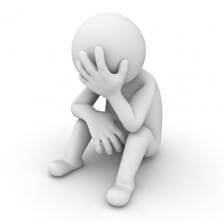Top 10 Causes of Dizziness
While most of us have experienced dizziness at some point in our lives, it can be one of the most vague and non-specific symptoms out there. So let’s shed some light on this rather mysterious symptom and talk about the 10 most common causes of dizziness.
Most of us have experienced dizziness at some point in our lives, but unfortunately, it is one of the most vague, non-specific, and difficult-to-dissect symptoms, for both patients and doctors. Dizziness is a challenge to understand because of the following two reasons:
- The symptom itself has various meanings, and is often difficult to put into words. Is it more “lightheadedness,” a sensation of the “room spinning,” simply general weakness, or a sensation of almost passing out? Dizziness is a rather vague symptom in the first place, and describing it can become an even further challenge.
- Dizziness can be linked to numerous organ systems. Could it stem from the heart, lung, brain, blood, or nervous system? Basically, dizziness is a non-tangible symptom that could be caused by an endless list of possibilities.
For most patients, a dizzy spell is not anything serious and resolves on its own. Rarely, though, it can be a sign of something more. And although episodes are often brief and self-limiting, they can be quite a nuisance to have to deal with while they are happening. Some people who experience dizziness can find it challenging to walk short distances or go about their daily activities, while infrequently, there are patients who are terrified to even move.
So let’s shed some light on this rather mysterious symptom and talk about the 10 most common causes of dizziness. Although this list is by no means comprehensive, most people suffering from dizziness do so because of one or more of the following reasons:
Medications
Among others, some anti-depressants (if stopped abruptly), blood pressure medications, prostate drugs, urinary incontinence drugs, and diuretics can cause dizziness.
Dehydration
Whether you are hiking up Mount Everest or simply sun-bathing in your backyard, exposure to heat, lack of sufficient fluid intake, and loss of fluids via sweat or urine can dry us up if we’re not careful. When dehydrated, our blood pressure can drop (especially upon standing quickly from a sitting position) and cause us to feel lightheaded. So be sure to drink plenty of fluids, especially in the heat, during exercise, and if you consume caffeine or alcoholic beverages (which are diuretics that cause us to urinate more water.) Think about that this summer vacation, when you are sipping a strawberry margarita on the beach!
Electrolyte Imbalances
Imbalances in potassium or sodium levels in our body (out of whack from our diet, medications, diarrhea/vomiting, or other medical conditions) can also cause dizziness. A simple blood test can detect this one.
Low Blood Sugar
Do you skip meals? Or are you a diabetic on insulin or certain drugs that drop blood sugars? Low blood sugar can certainly send us off balance.
Anemia
Young menstruating women with heavy periods are one of the most common groups of patients with anemia. However, those who spill microscopic amounts of blood in the stool (from a bleeding stomach ulcer or problems with the colon, for example), or those have other types of anemia, can also experience dizziness. Your doctor can check you for anemia with a blood test.
Anxiety/Depression/Stress
Patients who tend to hyperventilate (even to a very mild degree) over time can, believe it or not, gradually experience a non-specific dizziness. This is why we’ve been taught to breathe into a paper bag when 
Meniere’s Disease
Not as common of a cause, but you may have heard about this one while searching the internet, so that’s why I mention it. Meniere’s Disease includes a triad of symptoms: vertigo, hearing loss, and tinnitus (ringing in your ears.)
Heart Problems
Heart arrhythmias, heart valve deformities, or other problems with the heart can also cause dizziness. This type of dizziness is typically experienced when patients are upright, and is often described as the sensation of “almost passing out” (or actually passing out.) It’s also more of a concern with older patients, those who have risk factors for heart disease, or those with prior heart issues.
Nervous System Issues
Strokes or diseases of the nervous system can also cause dizziness–but note that they often are accompanied by other disturbing systems, not just dizziness.
Vertigo
This is by far the most common cause of dizziness (and something that I will need to tackle in more detail in a future episode.)
Our center of balance is located in our inner ears on both sides, in what is referred to as the “vestibular system.” Some patients whose vestibular system is not equal in both sides may experience a sensation of movement–either of the “room spinning” or the illusion of themselves moving–throughout their lives, and this can often be triggered and/or worsened by head movement.
Viruses can also attack the inner ear and wreak havoc on our sense of balance, as can any other inner ear problems (such as inflammation, extra fluid buildup from allergies, etc.) This is benign, but can be a challenge to have to deal with on a daily basis. It typically self-resolves within a few weeks or less.

And there you have it: the 10 most common causes of dizziness. As you can see, serious causes of dizziness are not that common. For most people, dizziness can be annoying to deal with, but is typically benign and self-resolving.
Share your ideas and learn more quick and dirty tips with us on the House Call Doctor’s Facebook and Twitter pages! You can even find me on Pinterest!
Please note that all content here is strictly for informational purposes only. This content does not substitute any medical advice, and does not replace any medical judgment or reasoning by your own personal health provider. Please always seek a licensed physician in your area regarding all health related questions and issues.
Photos of dizzy woman and figure sitting down courtesy of Shutterstock







